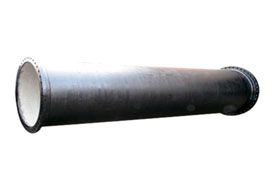
A particular kind of pipe that is often used in many different applications, particularly for the conveyance of fluids under pressure, are centrifugally cast iron pressure pipes. The method of centrifugal casting, which involves pouring molten iron into a mold or form while it is spinning rapidly, is used to make these pipes. This method creates centrifugal force, which distributes iron uniformly throughout the inside surface of the mold, producing a seamless, long-lasting pipe. These pipes are renowned for their durability, ability to withstand pressure, and ability to withstand corrosion.
Pressure pipes made of centrifugally cast iron are essential parts of key infrastructure systems that guarantee the distribution of safe gas, the delivery of clean water, and the appropriate handling of sewage and wastes. They are a great option for many utility and industrial applications because to their adaptability and dependability.
Under IS standard IS 1536:2023, all centrifugally cast (spun) iron pressure pipes for gas, water, and sewage are now required to be part of the ISI Certification Scheme.
Centrifugally cast (spinning) iron pressure pipes for water, gas, and sewage are described in this standard along with their production, chemical, and physical requirements as well as their testing protocols. High-quality metal that satisfies the mechanical requirements specified in the standard is required for building pipes.
Without the ISI Mark, this product cannot be marketed, imported, or exported into the Indian consumer market.
Indian Standards Institute, or ISI was renamed the Bureau of Indian Standards (BIS) in 1987. The official mark that the Bureau of Indian Standards provides for manufacturers of various goods is the ISI Mark. It is used to indicate compliance with Indian standards (IS) set by the Bureau of Indian Standards (BIS) and has been used as a conformity marking for industrial products. Manufacturers received permission from BIS to use the ISI Mark on items that comply with relevant Indian requirements through the product certification program.
Only manufacturers (domestic or foreign) who produce the finished product will be awarded ISI Certification. This will not be given to any product importers, traders, dealers, or distributors.
The following documentation is required to get an ISI certification:
For more detailed information, please click here.
There are two approaches for Indian manufacturers to become certified with the ISI Mark:
Regular Procedure
With the possible exception of cases deemed "All India first," which might take up to 180 days, the licensing procedure is expected to be finished in 120 days. This timeline starts on the day the application is received, assuming that at different points in time the documentation, unit assessment, and product conformance are all deemed acceptable.
Step 1: Manufacturing Unit Customization in Compliance with Applicable Indian Standards
Step 2: Submission of the Application Form
For more detailed information, please click here.
Simplified Procedure
This is a much faster process than the standard procedure. After a factory inspection is deemed satisfactory and the initial evaluation establishes that the sample complies with the applicable Indian Standard(s), the license application process is expected to be finished in 30 days.
Step 1: Adapting the Manufacturing Unit to Comply with the Relevant Indian Standard
Step 2: Sample Testing
For more detailed information, please click here
The process of obtaining ISI Mark Certification for Foreign Manufacturers typically includes the following steps:
Step 1: Application
Step 2: Query Raised (If Any)
For more detailed information, please click here.
Brand Liaison provides helpful support for achieving ISI Mark Certification. Among our offerings are:
Please click here to get in contact with our team of specialists for a deeper explanation of the paperwork and steps needed to get ISI Mark Certification.